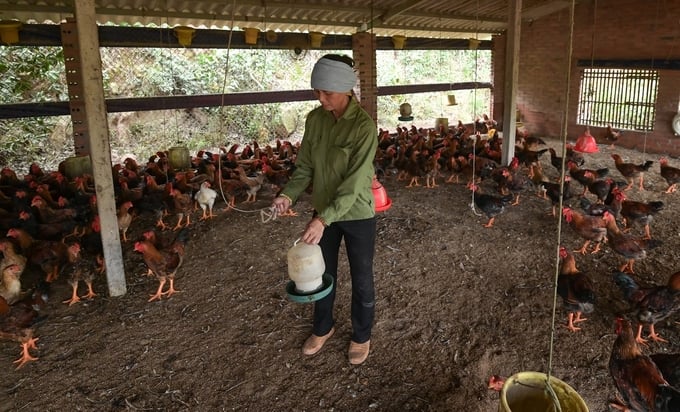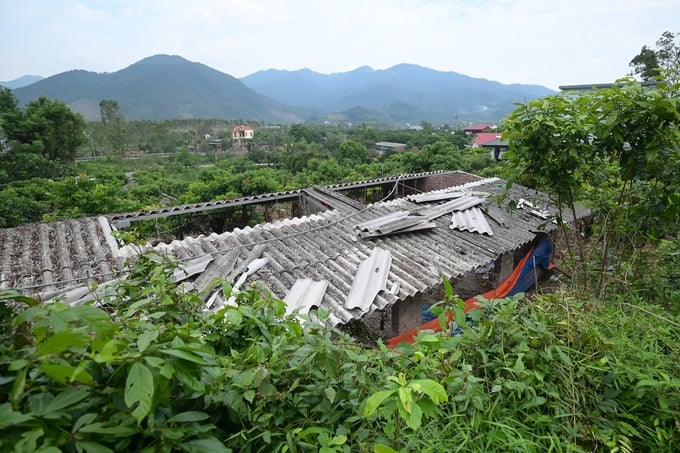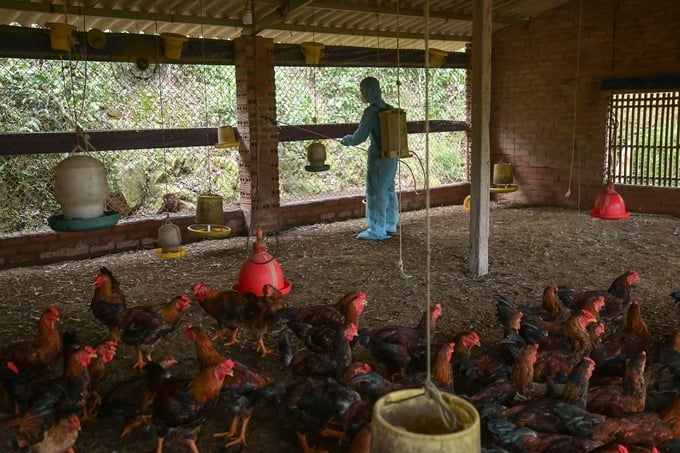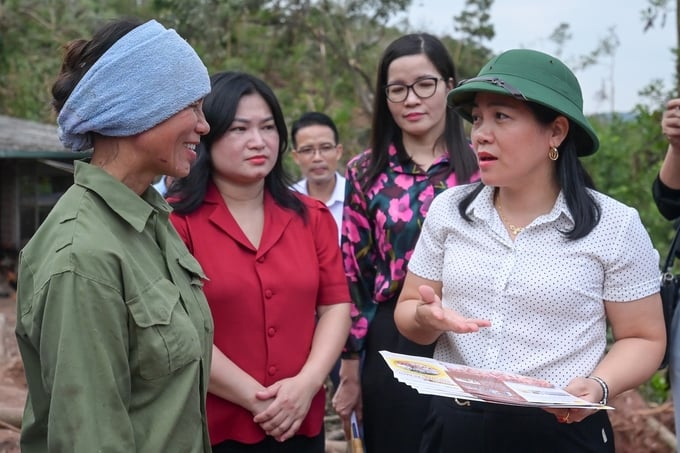June 16, 2025 | 16:07 GMT +7
June 16, 2025 | 16:07 GMT +7
Hotline: 0913.378.918
June 16, 2025 | 16:07 GMT +7
Hotline: 0913.378.918

Nguyen Thi Oanh is checking equipment and cleaning livestock barns after Typhoon No. 3. Photo: Tung Dinh.
Being lucky enough not to suffer much damage from Typhoon No. 3, Nguyen Thi Oanh in Hoang Hoa Tham commune is urgently repairing the chicken barn before getting the new batch of chickens. During the recent storm, one of her family's chicken barns collapsed and many others had their roofs blown off. Immediately after the rain stopped, Oanh cleared the trees around the barn, sprayed disinfectant, rebuilt the fence and patched up the punctured roofs.
This is the right time to prepare chickens for Tet. “Ensuring the livestock environment after the storm is very important. The staff of the provincial Agricultural Extension Center and the district Agricultural Service Center constantly provided technical guidance and distributed leaflets of encouragement so that I could confidently resume production,” said Oanh.

A damaged chicken barn of Oanh's family. Photo: Tung Dinh.
As a mountainous commune of Chi Linh city, Hoang Hoa Tham mainly develops the people's economy based on livestock and crop farming. Preliminary statistics show that nearly 85% of the commune's over 1,200 livestock farms were damaged.
According to Diep Thi Thu, Director of the Chi Linh City Agricultural Service Center, livestock farms in the area have always followed the livestock farming process, ensuring biosafety and disease prevention according to regulations. The local chicken farms have an average scale of approximately 3,000 chickens/batch, raising 2 - 3 batches per year. After each batch, farmers often leave the barns empty for 20 - 30 days to have them cleaned.
“This is the peak period. We need to focus human and material resources to overcome the consequences of storms and floods. The Agricultural Service Center has sent staff directly to key livestock areas to provide professional support to people, particularly in terms of disease prevention and control,” Director Thu said.
Chi Linh City is entering the peak month of disinfection and sterilization. Therefore, in addition to cleaning the barns, Tran Thi Hai, Director of Hai Duong Agricultural Extension Center, suggests people pay more attention to the surrounding environment because many households have long had the habit of raising chickens under the forest canopy and fruit trees.
Along with spraying disinfectant, farmers can sprinkle lime powder in the sewers, barn yards, and farms at a rate of about 20 - 25 g/m2. They also need to calculate the appropriate time to let the cage “rest”. If raised for a long time, the chicken's weight will only increase by 100 - 200 g/month, while farmers have to spend more on feed costs.

Agricultural extension staff help farmers spray disinfectant on barns. Photo: Tung Dinh.
Statistics from the Department of Agriculture and Rural Development of Hai Duong show that Typhoon No. 3 damaged nearly 300,000 chickens and blew off the roofs of many chicken farms. Hoang Hoa Tham, one of the seven key chicken farming communes and wards in Chi Linh city, was severely affected by the floods.
“Farmers face many difficulties as they are preparing for Tet. Tens of millions of VND is considered a small loss, while some families lose hundreds of millions of VND. In particular, one household in the commune lost up to 2,000 chickens,” said Tran Bich Thuan, Chairman of the People's Committee of Hoang Hoa Tham commune.

Pham Thi Dao, Deputy Director of Hai Duong Department of Agriculture and Rural Development went to the grassroots-level facilities and provided technical guidance to farmers. Photo: Tung Dinh.
In order to quickly stabilize production after the flood, as well as prepare food supplies for the peak months at the end of the year, Hai Duong Department of Agriculture and Rural Development recommends that farmers choose breeds with clear origins and quarantine certificates.
Due to the impact of Typhoon No. 3, vaccination for poultry needs to be checked and all types of vaccines need to be fully reviewed as per regulations. Farmers should not restock without ensuring environmental protection and disease safety.
Apart from breeds, feed and vaccines, Pham Thi Dao, Deputy Director of Hai Duong Department of Agriculture and Rural Development, also gives recommendations on the timing of herd restoration. Due to the impact of storms and floods, the price of animal feed may fluctuate. If not carefully calculated, farmers will struggle in terms of reinvestment costs as well as profits.
Translated by Samuel Pham

(VAN) The working delegation from the Ministry of Agriculture and Environment conducted an important trip to the Netherlands to strengthen strategic partnerships and sustainable development in the agricultural sector.

(VAN) The letter ‘A Plea from the Ocean’ not only evokes emotion but also awakens the human conscience to the responsibility of protecting life on Earth.

(VAN) The Department of Agriculture in South Africa has announced the country’s first mass vaccination of poultry to prevent local birds from contracting avian influenza.

(VAN) Establishment of the Mekong Delta Regional Agricultural Linkage Center, aiming for a closed value chain, deep processing, trading platforms, and international market connectivity.

(VAN) Gia Lai province has recently recorded 460 rare species of animals and plants, contributing to forest conservation and biodiversity planning in the region.

(VAN) Ms. Caroline Beresford, New Zealand Ambassador to Vietnam, expressed confidence that agricultural cooperation between Vietnam and New Zealand will develop sustainably, be climate-resilient, and promote gender equality.

(VAN) Vietnam reaffirms its commitment to international cooperation in fostering sustainable and responsible fisheries while ensuring resilient livelihoods for small-scale fishing communities.